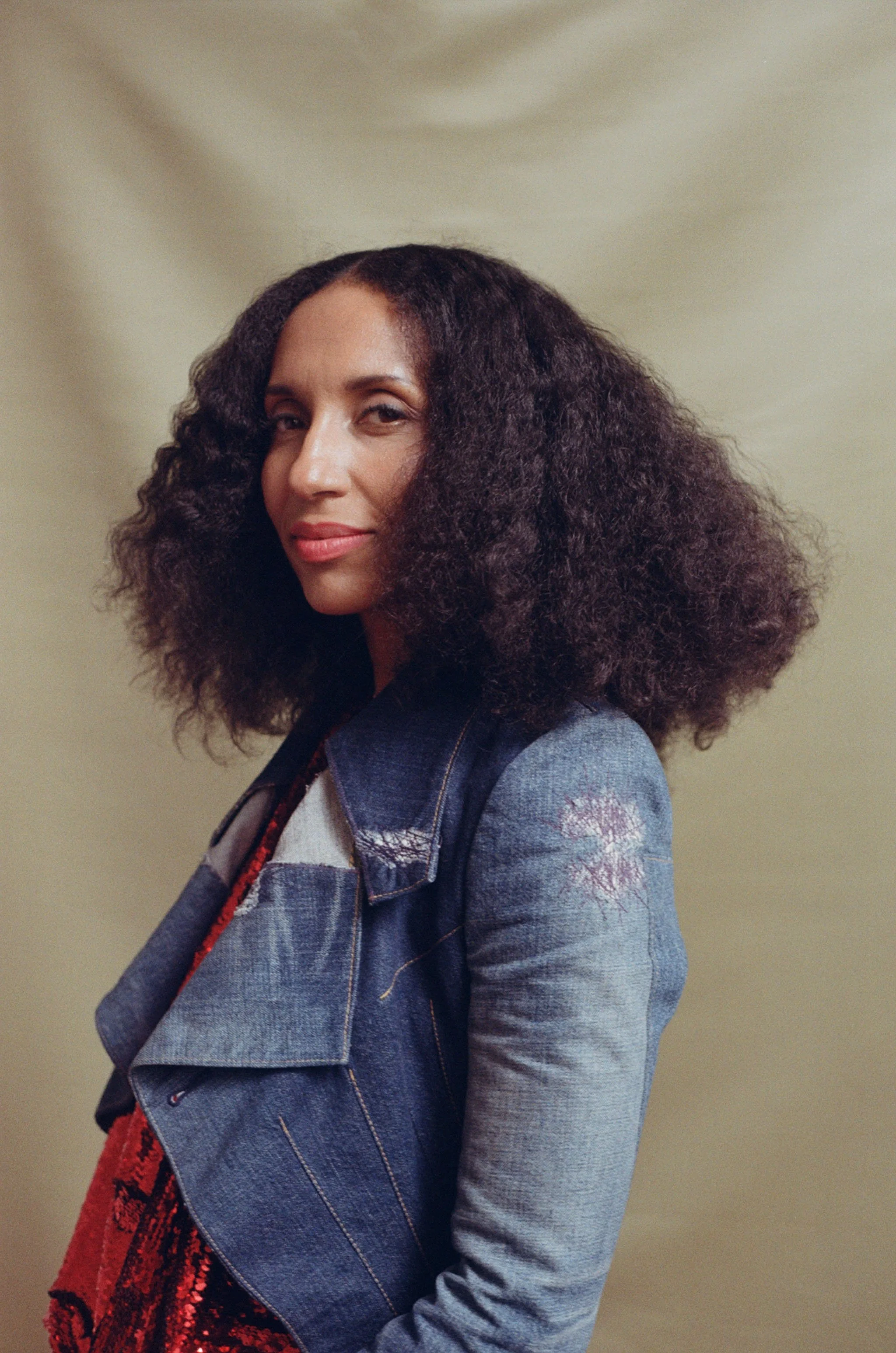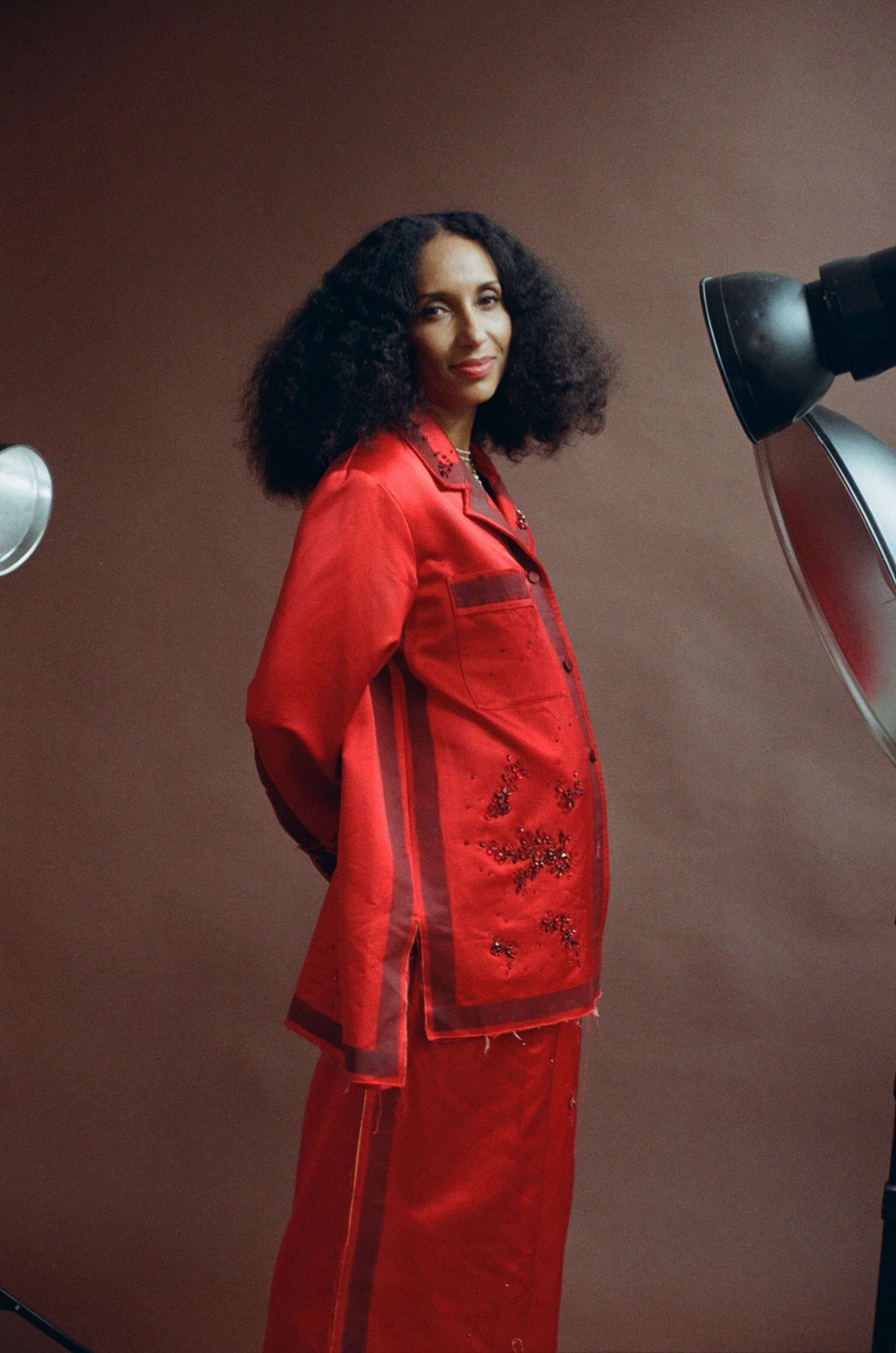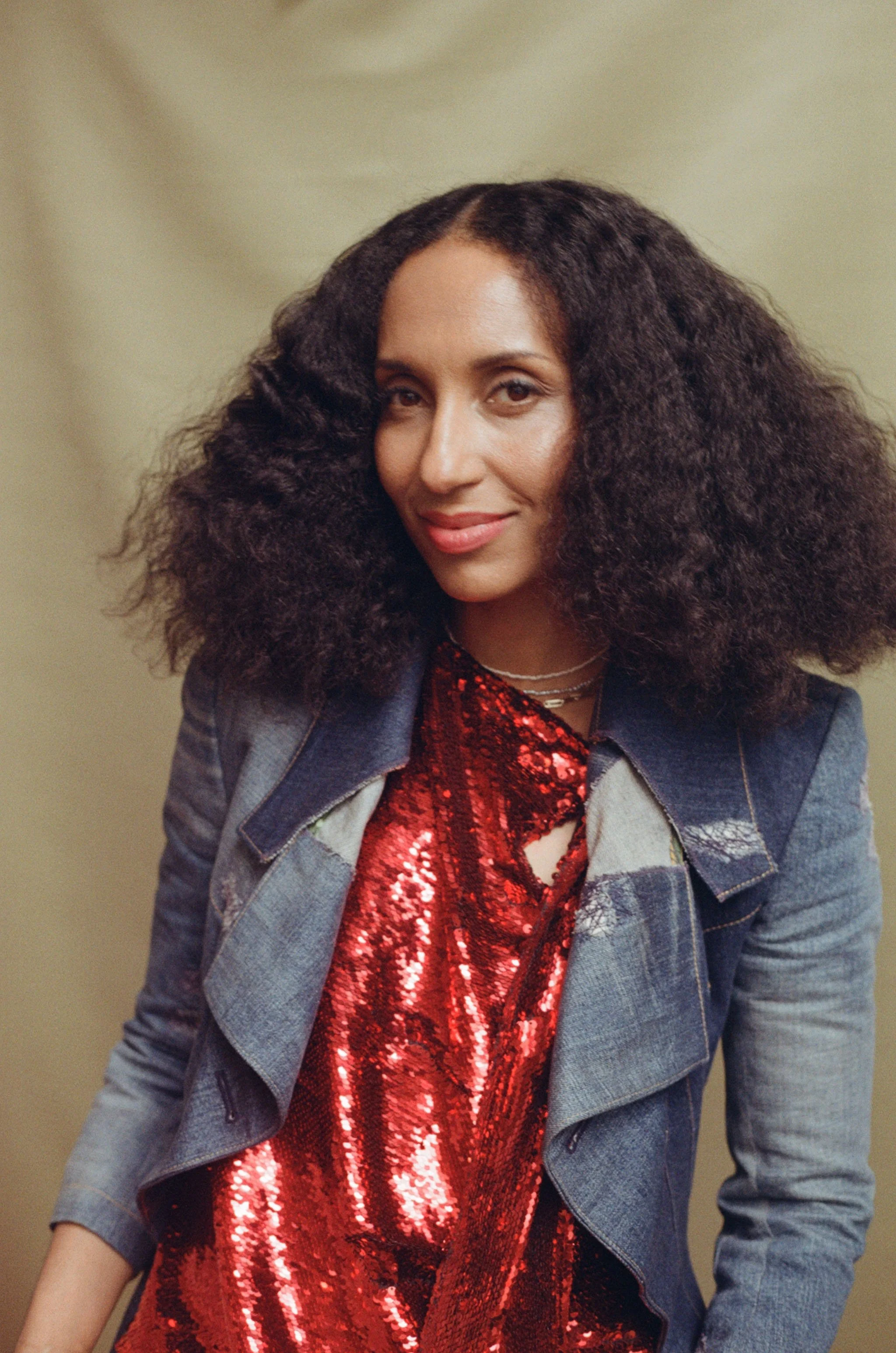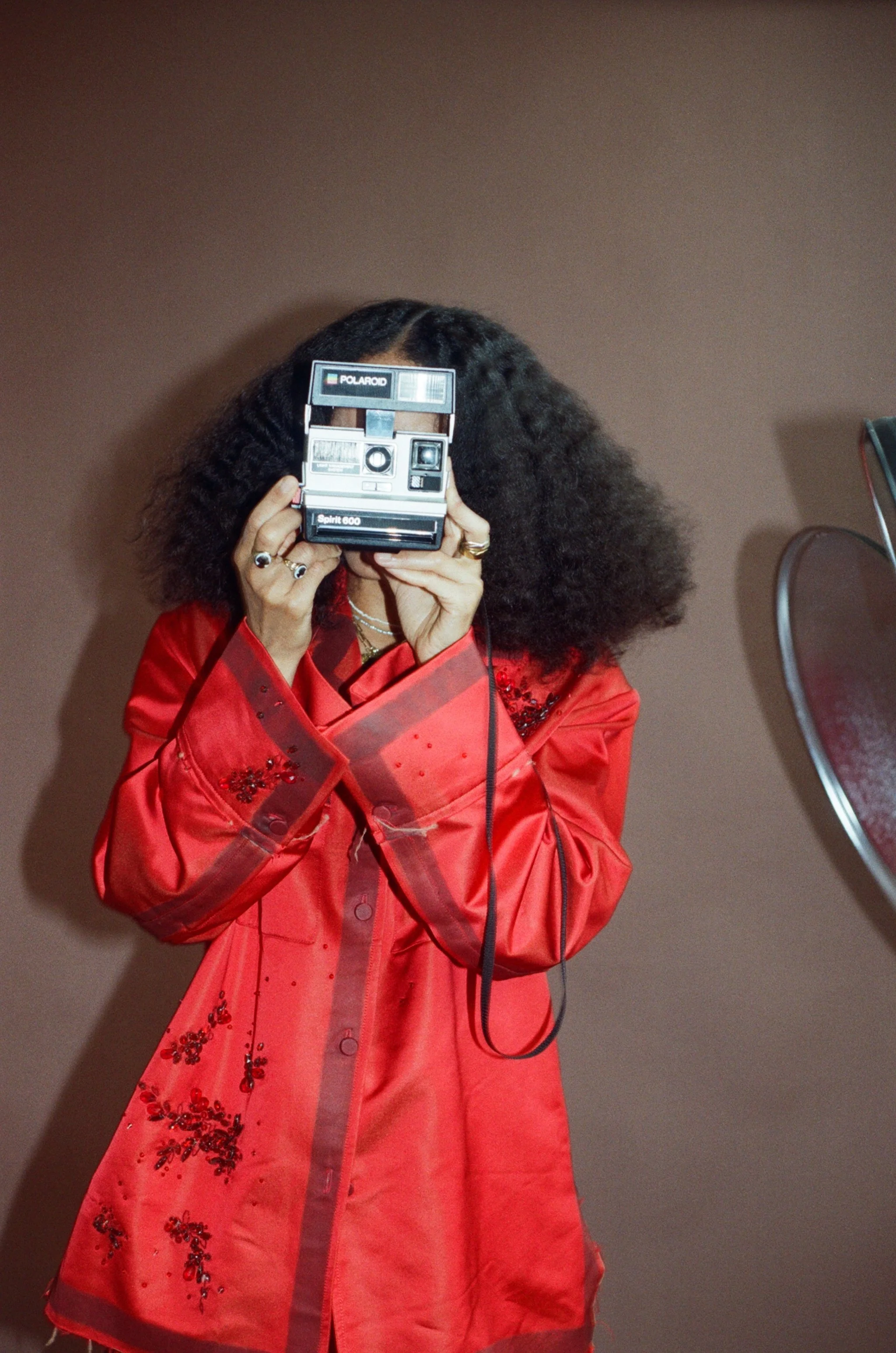Chioma Nnadi on Editing Vogue, Interviewing Rihanna, and Fashion Icks
This piece is part of The Jade Issue, a special issue of Polyester guest-edited and curated by Jade Thirlwall. Jade handpicked each of the musicians, activists, writers and it girls in the magazine as an exercise in trying to create the publication she wishes she’d been able to read growing up. Get your copy here!
Photography: Chloe Sheppard | Makeup: Natalie Gay using Tom Ford Beauty | Hair: Charlotte Mensah | Photography Assist: Lewis Vorn
Make it stand out
When Chioma Nnadi was appointed Head of Editorial Content at British Vogue late last year, many breathed a sigh of relief. Some had wondered whether the new editor would continue making the strides in diversity and inclusion that had characterised Edward Enninful’s six year reign at the top of the magazine. But when Chioma was announced as his successor, it was clear that the publication was in safe, and very cool, hands, as proven by her first cover for the magazine, which showed FKA twigs in LOEWE, atop that most British of things: a black cab.
Chioma’s career has been defined by a commitment to seeking out new talent as well as elevating and changing our perceptions of existing ones – she does, after all, self-describe as a “storyteller”. She began working as a journalist in her early 20s, for publications like The Fader and Trace, and in the time since, her interview subjects have included stars like Rihanna and Angelina Jolie, all while acting as a vocal advocate for change in the fashion industry.
Here, Jade sits down with Chioma to discuss the start of her tenure at British Vogue, the changes she’s seen in the fashion and journalism industries throughout her lengthy career, and the time Rihanna did her makeup…
Jade: Hi Chioma! Since your appointment as head of editorial content of British Vogue, how has your experience been so far?
It's been really fun, and it's quite nerve wracking. I think the fun part is kind of trusting your gut and knowing who and what you want to celebrate – that's an easy thing to do. But it's the getting to the end result and getting everything done in time that is the hard part.
Is that the challenge, do you think?
Yes. I think also having come back to the UK, there's great things about it. But there's gaps in my cultural knowledge. I feel a bit like a quick study on certain things. But luckily, I've got great colleagues who have been really helpful with the things that I'm less familiar with. The fashion side of it's easy, and then the cultural things I'm learning - just doing a lot of going to the theatre to see shows, going to see everything. It's been fun.
In your move back to the UK and transition into British Vogue, what differences have you noticed between New York and London's fashion landscape?
I think I always gravitate back towards the London fashion scene, because I just think the energy is so much more boundary pushing. It's scrappy but it's fun. You see people take chances, you see real creativity here. Not that you don't see that in the US, but London has a legacy and these amazing fashion schools, like Central Saint Martins. People come here from all over the world to study and get a piece of that. The other week, I went to my first CSM graduate show and it was kind of amazing to see the creativity there and what the students get up to, just to see the next generation of designers. So I think, here the energy is a little bit more bold, it's a bit more fearless. And I think there's a reason that so many creative directors come from here. People come here to scout the next generation. We think big. And there's a very clear point of view. It's not a watered down version of someone else's vision. No, I think people here have a real sense of who they are.
How has your heritage influenced your perspective on fashion?
Having a background with multiple cultures, I've just been exposed to a lot and had to navigate different places and different spaces that I think influenced my curiosity. I was very influenced by my Nigerian roots just because of the history of prints and daring colour. Going to Nigeria for the first time was really a trip that I'll never forget, even as a seven year old, because I saw all of my aunties wearing their head wraps and their colourful prints. That was a huge influence on me. My aunt is a seamstress and had her own clothing business. And so I think having all of those influences could only broaden the way I look at the world. And I think I'm not afraid to move between different worlds in a way, or I’m more comfortable with that.
I think that’s the joy of being mixed race.
Yeah, I think so too. My mum was always like, “You're so lucky, you get to experience two cultures, like you get to see the world from two different standpoints.” And for me, it was three because my mum's not British, she's Swiss and, and even continental Europe has a slightly different flavour as well; different traditions and customs. Both my parents really encouraged me to see my mixed background as being an advantage, and not something that would hold me back, you know? I mean, it wasn't always easy. I didn't feel that way.
But look at you now.
Look at you now.
You've obviously had a very illustrious career, interviewing stars like Rihanna, Angelina Jolie, and FKA twigs was your first British Vogue cover star. Do you have any favourite memorable moments with those stars or interviews?
Each interview was its own kind of special moment and I always get tied up in knots before I do a big interview. Oh my god, because the chemistry has to be right. You don't know whether the vibes are off. It can be just an hour of your life that you wish you just could take back. But I've been fortunate that the kind of women I most admired, I kind of had a good moment with or good chemistry with them. Each one was different. I mean, Rihanna was my first big cover story ever, for Vogue. So I was extremely nervous. And it was quite a process, because I had gone to interview her in Ibiza, and she didn't really have time to talk to me in Ibiza, so I had to fly to Paris.
Just to have a convo?
We were up all night just chatting! I was like, I forgot that I was doing an interview and I was just hanging out with a mate. And then you've just gotten to a place where you're having a conversation and this is two women chatting. Which is the best you know, that to me was really fun. And I remember she did my makeup the next day. It was more makeup than I usually wear!
Was this before Fenty?
She had just launched it, so she gave me a full beat. But yeah, I mean, just having her touching my face…
How did your early experiences at publications like Trace and The Fader shape your approach to journalism?
I think it was a really fun time to get into magazines, because it was a whole scene, we didn't have the internet. You could really go out into the world and find a story. You sort of had to be out every night, meeting artists, discovering new musicians… It was a different time. We don't do that anymore - now you can basically sit on the internet and find everybody - but then it was much more about going out into the world. Maybe someone would tell me about a new person, a new artist, a designer that they'd seen. It was kind of the nascent kind of moment of blogs – they were just sort of bubbling up. There wasn't the internet that we know today. Yeah, it was really fun. And I just got to kind of go out and meet a lot of people and really immerse myself in New York life. I was 22 when I arrived in New York, and I just did not sleep.
“What's been interesting is seeing that there’s no more gatekeeping around criticism. You see on social media accounts that break down the look, they break down the shows, they have their opinion, they have their own followings. I think it's really healthy to see different voices come out beyond the traditional challengers.”
You mention the significant shift towards digital media. How do you envision the future of print media and the fashion industry?
It’s so funny. This morning [at Vogue] we had our summit, and we’ve been talking about how AI might impact digital media. And I do think that these brands that people trust – media outlets that people trust – are going to become even more important, because there's just so much rubbish. There's so much out there that’s noise. But I feel hopeful, I think. Obviously, everything's changing and we're in a moment where technology and the way we consume media is changing so much. I think that we should just use those tools to our advantage wherever we can. It’s not something that can replace print, because there's not that feeling of picking up a magazine.
I’ve seen you say before that back when you were a teenager, you didn't have the means to buy designer brands, but loved the fantasy of recreating the looks you saw. Can you tell me a bit more about this? What were your inspirations?
I was very into indie mags, and I was very into music. Neneh Cherry was a big influence and “Buffalo Stance”, that whole kind of Raw Like Sushi era. I was really looking at the style of musicians more than anything - I remember I was very obsessed with Bjork. She lived in Soho, and I would see her and her son walking around. Maybe she was taking her son to school because I grew up not far from there. And all the trainers that she was wearing, I would buy – she was wearing Nike Air, I bought them. She had the Reebok pumps – I bought them. I was just like, literally, her sneaker stalker. That was my entry into the world of fashion. And also vintage was my thing and I'd go into Portobello Road. That was how I got into fashion, just buying something that was secondhand and reinventing it every so often. I probably looked insane sometimes, but I think you can get away with it. Until I became a grown up and then I had to turn it down a bit. But I was definitely wild and wacky and my fashion choices were always a form of self expression for me.
What's the one piece that you keep reaching for in your closet? Especially this summer? And why is it a favourite?
I think this Junya denim suit is a favourite. I got it on eBay. And it's from like, a mid-2000s collection. But you know, there are certain collections for denim, especially for Junya Watanabe denim, that I look out for. So I'm constantly collecting pieces, and that one is my summer suit.
Is there a fashion trend you wish would get in the bin?
I'm always surprised because I'm always like, “Oh, I hate this fashion trend.” And then it comes back in a different way and I’m here for it. I think I've voiced this to some of my colleagues before, but I don't love the invisible socks on men that aren't invisible.
I hate those. I just feel like they must really smell.
Just be proud of your ankles with a nice sock. It's not something to be ashamed of.
Do you have a cringy fashion era from when you were growing up?
I was asked this question recently. I had a period where I wore a hat, like a fedora. A white rimmed fedora hat, and sometimes I see pictures of me and I'm like, “Oh, she looks kind of mysterious, but why did I wear this hat indoors all the time?”
In light of your journey from indie magazines to British Vogue, what are the most significant changes in fashion journalism?
What's been interesting is seeing that there’s no more gatekeeping around criticism. You see on social media accounts that break down the look, they break down the shows, they have their opinion, they have their own followings. I think it's really healthy to see different voices come out beyond the traditional challengers. Of course I think the critics that we see, who have that wealth of knowledge and have that experience are great too. We have many of them that work at Vogue, like Sarah Mower, and Nicole Phelps, they’re authorities in the industry, but it's also great to see other inputs and to hear people who contribute to the conversation in different ways. I think it only enriches the industry if we have a chorus of voices and not singular ones.
So you think social media voices have helped with more diversity in the fashion space?
I think they're holding brands to account and we need to continue to do that. Because this idea of diversity and inclusion can become a bit of a trend: One season people are talking about it, and then next minute it dies down again. If there aren't people who are like holding people to account then there's no reason that these brands need to stay the course.
I love seeing that. Like for me growing up, especially up north, as a mixed race girl, I'd get magazines and I'd always cut someone out and put it on my wall, but it was never really someone that looked like me. It was always like, hair-wise, it was like “How to tame your frizz.” I love my frizzy hair, it’s so sad. So it’s really positive to see even just within the industry for me, from like 11 years ago to now, and seeing the transformation. My first ever shoot with the band, I was in tears because they photoshopped my nose at the time. I love my nose now but I used to always get bullied for having an “Arab nose” and things like that so when they changed it for my first photoshoot, that like triggered me to be like, “I'm gonna get a nose job, I want to change this about myself and do these things.” My first entrance into the fashion industry was to immediately want to change how I looked. That really carried with me for many years and I think it's only in the last sort of five, six years that I've really started to embrace my heritage again and be proud of it. I’ve fallen in love with my natural hair again, all these things. And it's never too late to be on that journey, obviously.
Finally, what advice would you give to aspiring journalists and editors of colour who are looking to make their mark in the fashion industry?
I would say feed your eye and know your perspective and get your voice out there. There's so many places where you can show the world what you care about. Because ultimately, fashion is subjective and having a point of view is why you know people want to know you, and the only way that you do that is by developing your taste, understanding what you like, knowing what you like. It's really important. That would be my advice.






